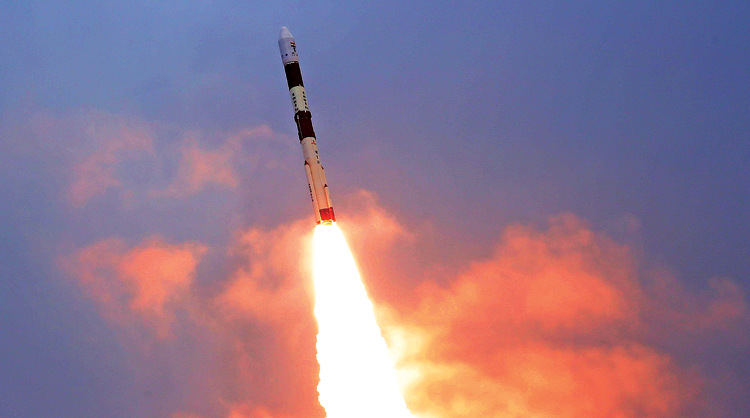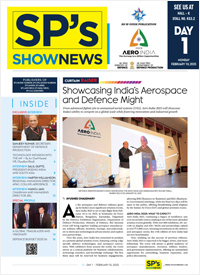- Prime Minister Narendra Modi inaugurates Aero India 2023 in Bengaluru; Releases Commemorative Stamp
- Defence Secretary meets delegations from Saudi Arabia, USA and Oman on the sidelines of Aero India 2023
- Foreign Ministers of 32 countries to attend Aero India 2023
- Embraer showcases the C-390 Millennium at Aero India 2023
Re-forming the Space
With new models, new arms and new approach, Indian space sector is advancing towards tapping the global space economy

Over a half-a-century back, humans stepped on the moon and the space exploration beyond our home planet has only expanded ever since. Space based applications and services have grown in multitude over the years than it was originally anticipated. Many new applications are being developed world wide to meet the growing user demands and requirements and the activities are only on a growth trajectory with huge commercial potential.
More and more countries are now emerging in the space league to study our planet, and other cosmic bodies. India’s space agency, Indian Space Research Organisation (ISRO) has continued to add feathers to its hat with many successful and over-arching missions often taking the world by awe. As ISRO continues its advancements, the space sector in India much like globally is also harnessing attention and looking for growth to tap into the global space economy. There are also many reforms that are taking place in the space sector. Here we look at some of those reforms awaited in the times to come.
In India, many Non-Government-Private-Entities (NGPEs) have also started engaging in space activities for commercial gains. Many startups and industries have started making launch vehicles and satellites and are eager to provide space based services. Participation of NGPEs including academic institutions, startups and industries in end-toend space activities is expected to expand the space economy.
In order to enhance the diffusion of space technology and boost space economy within the country, the Department of Space (DoS) is encouraging the participation of private companies in space activities. ISRO shall complement DoS in its objective of opening up the space sector to private industries. In this regard, the following reforms are proposed in the mode of execution of space activities in the country:
- In order to enhance utilisation and maximise benefits from the space assets, it is proposed to change the approach from “Supply Based Model” to “Demand Based Model”. NewSpace India Limited (NSIL) will act as the aggregator of user requirements and obtain commitments.
- NSIL to take ownership from DoS for operational launch vehicles, commercialise launches, satellites and services.
- Permit NGPE’s to carry out space activities through an Indian National Space Promotion and Authorisation Center (IN-SPACe)
- ISRO to carry out capacity building in Space domain through development of new technologies and capabilities and enable sharing of facilities by NSIL and NGPE’s.
- Announcement of opportunities for NGPE’s offering challenges in new domains of technology.
ISRO had also highlighted the gamut of space activities being considered to be taken up by NGPEs, including:
- Production of components and subsystems of a launch vehicle, launch vehicle integration and testing which is meant for space launch
- Production of components of a spacecraft, spacecraft Integration and testing for the purpose of space launch.
- Space launch of spacecraft on board a launch vehicle and establishment/operation of launch infrastructure.
- Providing space based services including operation, control and station keeping of spacecraft by establishing and operation of ground segment/ stations.
- Development of space based applications using satellite data and rolling out of commercial services.

These reforms, that are being considered and explored not just by the department or the space agency but also the government, are likely to aid India’s progress in developing a competitive space market globally. In an interaction in December 2020 with the space community, Prime Minister Narendra Modi also pointed out the same. “I had a productive interaction with industry leaders, academicians and the start-up community associated with the space sector. India is making remarkable strides in this sector. This sector has also witnessed path-breaking reforms this year,” the Prime Minister had tweeted.
ISRO Chairman K. Sivan, Bharti Enterprises Chairman Sunil Bharti Mittal, L&T Senior Executive Vice President for L&T’s defence business Jayant Patil, Agnikul Cosmos founder Srinath Ravichandran, Pawan Kumar Chandana from Skyroot Aerospace Ltd, Colonel H.S. Shankar from Alpha Design Technologies Pvt Ltd, Rakesh Verma from MapMyIndia, Awais Ahmed from Pixxel India and Srimathy Kesan from Space Kidz India were present during the interaction.
Adding that developing such market can help replicate the success of the IT industry in India, the Prime Minister said, “Private investment in the (space) sector will lead to the creation of hi-tech jobs, which will provide a host of opportunities to the talent pool in IITs/NITs and other technical institutions.”
The reforms in the space sector will not only ensure the ease of doing business, but also provide necessary mechanisms in place to help participants at each stage, including the availability of testing facilities and launch pads, Modi said, adding that these reforms are to make sure that India becomes a competitive space market and also that the benefits of the space programme reach all.
In June, India had opened up its space sector, to let private firms and startups build satellites and rockets, besides offering space services to customers in the country and across the world.The government had also shifted all operational assets of ISRO to New Space India Ltd (NSIL), a commercial entity, and formed the Indian National Space Promotion and Authorisation Centre (IN-SPACe) as a regulator to ensure a level-playing field for the private sector. At that time Sivan had pointed out the requirement for navigation policies to make the space sector more accessible to private players.
Going further, several ventures had submitted proposals with IN-SPACe under the DoS, pertaining to a vast range of activities including satellite constellation, small satellite launch vehicles, ground station, geospatial services, propulsion systems and application products.
During the interaction the ISRO chairman also briefed the Prime Minister on various proposals received from the industry for obtaining permission from IN-SPACe and support from the DoS. He informed that over 25 industries have already approached DOS for undertaking their space activities.
The first quarter of 2021 is expected to witness the launch of ISRO’s rocket Polar Satellite Launch Vehicle-C51 (PSLV-C51). The primary payload will be the Brazilian satellite called Amazonia, an earth observation satellite. However, the significant highlight is that the rocket will also be carrying the earth observation satellite Anand, an advanced earth observation satellite, which has been made by the Indian startup called Pixxel (Incorporated as Syzygy Space Technologies Pvt Ltd). The Bengaluru-based private space technology company plans to have its constellation of 30 small earth observation satellites up in the sky by the end of 2022.
The reforms ahead are aimed at standardising as well as enhancing the space sector missions as well as manufacturing to become a hub for the world especially as more and more countries are entering the space sector and looking for lowcost launch vehicles. While indigenous production will certainly hail advantages for India but if we can manufacture and export these especially to the countries who don’t have the manufacturing infrastructure, there is a significant growth and development possibility that awaits.





